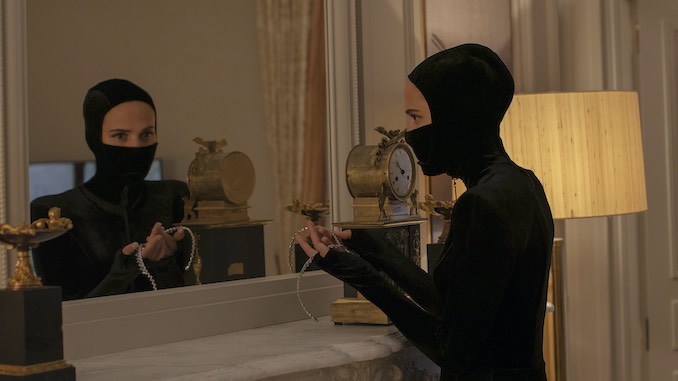Irma Vep’s Boring Finale Proves Its Own Bleak Point About Peak TV
Photo Courtesy of HBO
Irma Vep is a lot of things, but mainly it’s a lot of mental gymnastics. It’s an 8-episode, A24 and HBO-produced remake-sequel hybrid of the 1996 film of the same name. Irma Vep (1996), directed by series creator Olivier Assayas, follows a fictional French filmmaker as he attempts to recreate a very real French silent serial called Les Vampires from 1915. The series follows the same premise and aims to achieve a similar goal, but instead of exposing the inner workings of specifically the French film industry, HBO’s Irma Vep aims to expose the industry in the age of streaming and Peak TV. Irma Vep is incredibly meta, even dipping into the real-life story of the actress who played Irma Vep in Les Vampires, Musidora, with Alicia Vikander stepping in to play the actress alongside her series-long portrayal of Mira—who we see portraying Irma Vep throughout the series. Wrap your mind around that.
Mira herself, a disillusioned actress fresh off the biggest hit of her career in the form of a massive, sci-fi action flick, is the most interesting part of the series. Her relationships with both the film industry and those around her create a compelling character, one worthy of all the praise Irma Vep received upon its initial release.
Throughout the series, the disastrous filmmaker Rene Vidal (Vincent Macaigne) constantly insists that the series he is making, the remake of Les Vampires, is actually just a very long film rather than an actual TV show. In a way, HBO’s Irma Vep is as well. After watching the series in its entirety, which featured pain-stakingly boring stretches staccatoed briefly with some sense of urgency or compelling interaction between the characters, I can’t help but wonder if Assayas did it on purpose.
The series finale, titled “The Terrible Wedding,” does offer some closure, as it allows Rene to move on from Irma Vep as a character and their project The Vampires. The series’ quiet ending, which caps its run with a monologue from Rene about how love is the one true thing we all should circle back to, allows all the events of the show to simply fade away. Vikander’s Mira is sent back to Hollywood off-screen, leaving TV behind to shoot a prestige film that will likely win her an Academy Award. In fact, Rene is the only character within the series that actually gets any closure. With brand new characters taking up unprecedented importance in the finale, and essential characters simply disappearing with no resolution, Irma Vep ends in a quiet frustration. Any and all threads left hanging from the almost slice-of-life nature of the series simply don’t matter anymore, now that the show (both Irma Vep and The Vampires) is over. Which, ultimately, brings me back to this question: what was the value of this remake?
In 1998, filmmaker Gus Van Sant (Good Will Hunting) subjected the world to a nearly frame-for-frame remake of Alfred Hitchcock’s Psycho. It failed spectacularly at the box office, received nearly universal hatred, and still remains a perplexing film to this day. Van Sant did an interview in 2018 discussing his reasoning for remaking the film, as well as why he decided to try to replicate it so closely. He revealed that, in the ‘90’s, executives “would rather make a sequel than an original piece, because there was less risk.” So, Van Sant gave the studios the risk-free film they wanted: a frame-for-frame remake of a huge hit. His intention? To prove to those studios that lighting doesn’t always strike twice, and that merely replicating what people loved once before doesn’t always guarantee success.
-

-

-

-

-

-

-

-

-

-

-

-

-

-

-

-

-

-

-

-

-

-

-

-

-

-

-

-

-

-

-

-

-

-

-

-

-

-

-

-








































